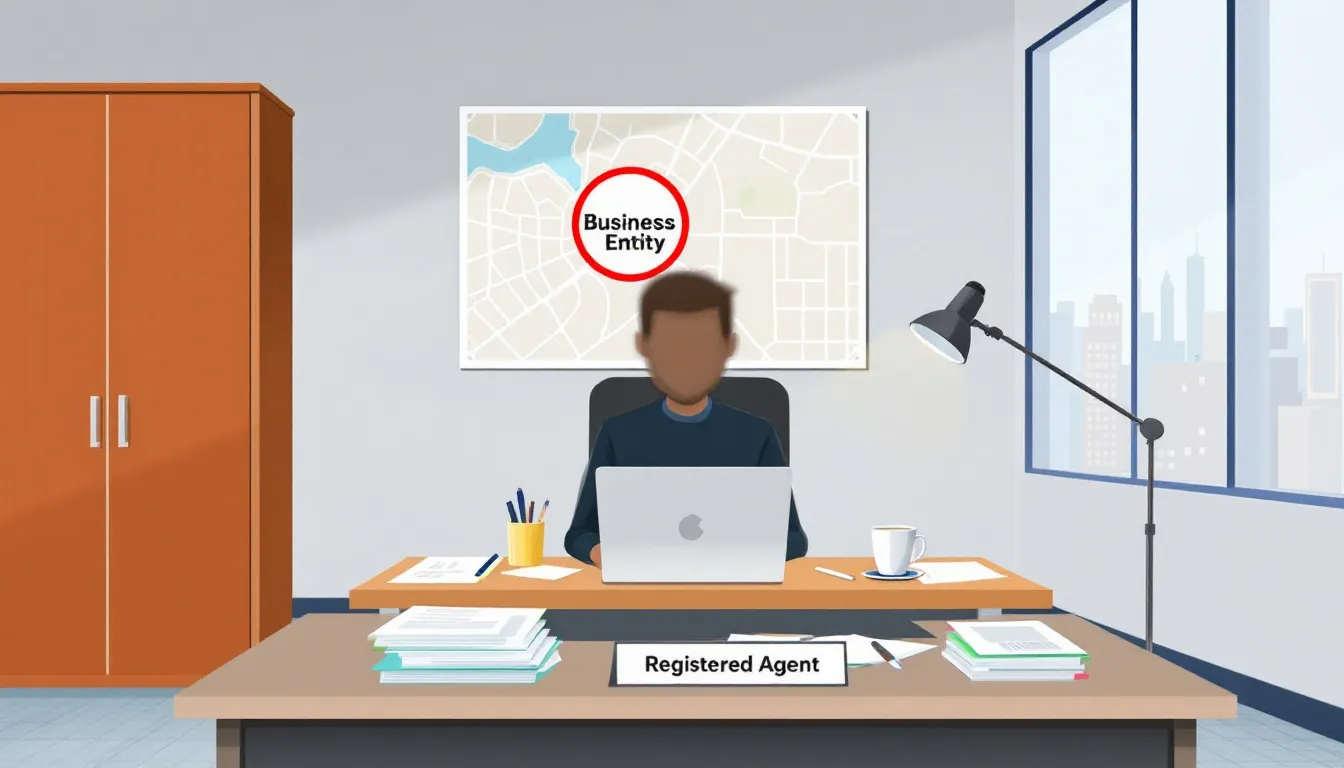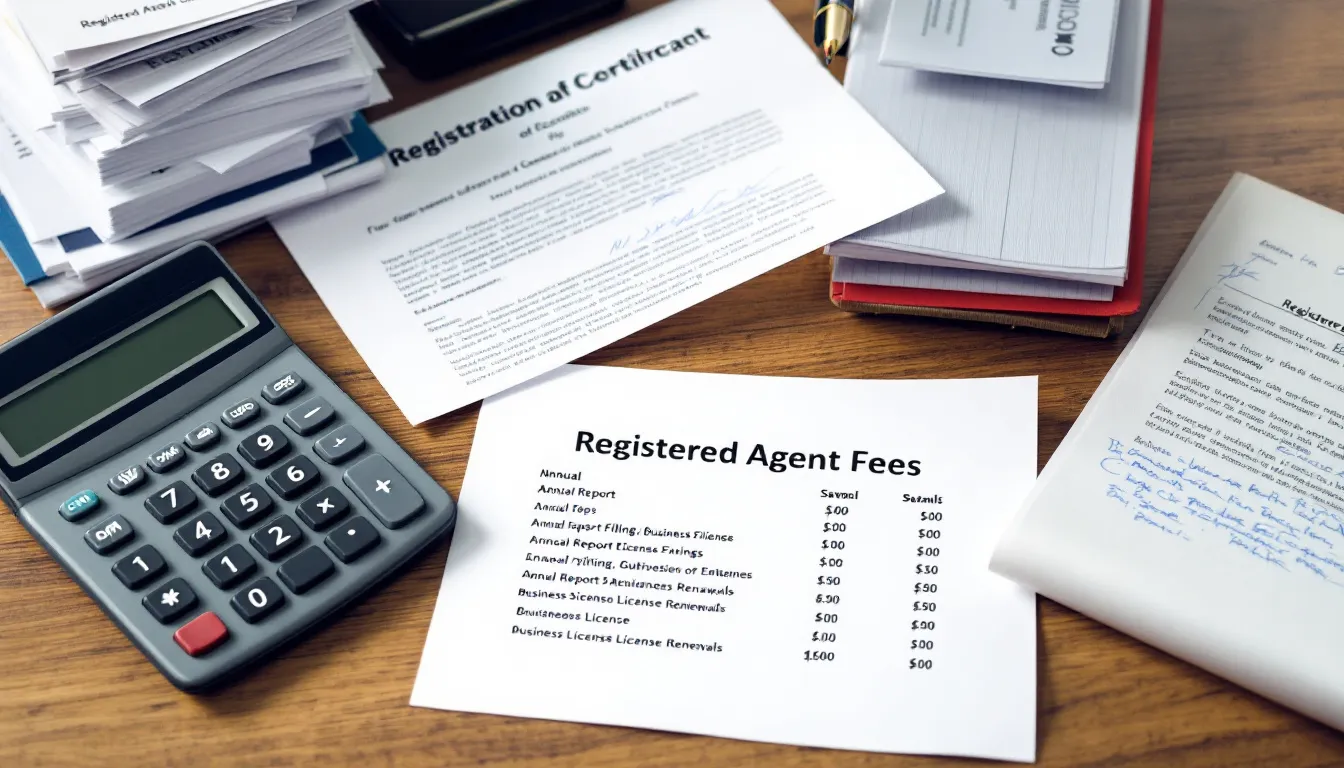Yes, you can be your own registered agent for your business. This choice, “can I be my own registered agent,” can save money and offer more control. But, there are important requirements and potential downsides to consider. This article will help you navigate the pros, cons, and legal details.
Key Takeaways
- A registered agent is essential for receiving legal documents and government notices for businesses, ensuring compliance with state laws.
- Being your own registered agent can save costs and provide direct access to legal documents, but it can compromise privacy and require regular availability during business hours.
- Hiring a professional registered agent service, while incurring an annual fee, offers privacy protection and efficiency, especially for businesses operating in multiple states.
What is a Registered Agent?

A registered agent is an individual or agency appointed to receive official documents and government notices on behalf of a business’s registered agent. This role is crucial for ensuring that legal documents, such as court summons and compliance notifications, are promptly received and addressed. The registered agent acts as the designated representative for a business, maintaining a reliable point of contact between the business and the government.
State laws mandate that all business entities, including LLCs and corporations, must designate an LLC’s registered agent. This requirement ensures that there is a dependable way for courts and government agencies to contact the business. Sole proprietorships, however, are not required to have a registered agent.
Failure to maintain a registered agent can lead to serious consequences, including the administrative dissolution of the business. The registered agent plays a key role in maintaining business compliance with legal and regulatory obligations, making their role indispensable for the smooth operation of any business entity.
Requirements to Be Your Own Registered Agent
You must meet specific state requirements to serve as your own registered agent. This ensures compliance with local regulations. This includes having a physical street address in the state where your business is registered; a PO Box is not acceptable. Additionally, you must be available during regular business hours to accept legal documents and notices.
You must either be an individual resident of the state or an authorized business entity to qualify as a registered agent. This ensures that there is always a reliable point of contact within the state for any legal or official communications directed towards the business.
Pros of Being Your Own Registered Agent

One of the most significant advantages of being your own registered agent is the registered agent cost savings. Handling this responsibility yourself eliminates the annual fees for hiring a professional registered agent service, which typically range from $100 to $300 or more.
Designating yourself as the registered agent also allows for greater control and immediacy in managing legal documents. You have direct access to legal notices as soon as they arrive, ensuring that you can respond promptly to any issues or requirements. This approach benefits small business owners who prefer to manage their legal correspondence personally.
Small businesses can streamline operations by keeping all critical communications in-house when serving as their own registered agent. This approach simplifies tracking important documents and maintaining compliance with legal obligations, which is beneficial for many business owners.
Cons of Being Your Own Registered Agent

While there are benefits to being your own registered agent, there are also significant downsides. One of the primary concerns is privacy. Your personal address becomes part of the public record, which can compromise your privacy and expose you to unwanted solicitations.
The influx of unsolicited mail can be overwhelming, increasing the risk of losing important legal documents in the clutter. Missing a critical legal notice or compliance requirement due to this clutter can result in legal or financial penalties.
Additionally, you must be present at your business address during regular business hours to accept service of legal documents and notices. This requirement can be time-consuming and impractical for many small business owners who need to focus on other business owner aspects.
Privacy Concerns and Public Records

Being your own registered agent means your personal address will be publicly available. Filing your business formation paperwork makes your home address part of public records, accessible to anyone. This can lead to privacy issues and unwanted solicitations.
Using a third-party registered agent can keep your personal physical address off public records, addressing major privacy concerns. This provides a layer of privacy protection and ensures that your home address remains confidential.
Handling Legal Documents and Notices
A registered agent’s primary responsibility is to handle legal documents and ensure timely communication delivery. This includes accepting service of process documents, which are formal notifications for lawsuits and other legal actions.
A registered agent must be available during standard business hours to accept legal documents and official notices to maintain compliance. Changes to the registered agent’s address must be reported to the Secretary of State to meet compliance obligations. Failure to meet these requirements can lead to financial penalties and loss of business standing.
Handling legal documents is challenging, as personal and business correspondence may intermingle. Serving as your own registered agent demands extensive knowledge of legal paperwork and can be labor-intensive.
Changing Your Registered Agent
To change your registered agent, file the appropriate form with the state to update the agent’s name and address. The new agent should offer instructions to ensure a seamless transition.
The cost of changing a registered agent varies by state. For example, in Texas, you must file Form 401 online with a $15 fee, while in Florida, the cost is $25 for LLCs and $35 for corporations. In Arkansas, there is no fee for this process.
Operating in multiple states requires a registered agent in each state, which can be both expensive and time-consuming. Promptly informing the state of any address changes is necessary to maintain compliance and avoid potential penalties.
Costs Involved in Hiring a Registered Agent Service

Hiring a registered agent service typically costs between $100 and $300 annually. For instance, LegalZoom’s registered agent service costs $300 per year, while Northwest’s service is $125 annually. The final cost varies based on several factors. These include the level of service, features, and the reputation of the provider.
One way to save money on registered agent services is to use free services included in business formation packages. Small business owners often hire registered agents due to the complexity and time-consuming nature of the process.
Hiring a registered agent service can streamline operations for businesses in multiple states by providing comprehensive coverage and eliminating the need to hire a registered agent to manage multiple agents.
How to Choose a Professional Registered Agent Service
Business owners often hire registered agent services to protect their registered agent address from public exposure. Opting for a professional registered agent can help avoid privacy risks associated with personal address disclosure.
Learn more about our professional registered agent services
These services assist businesses in multiple states by offering an established network of agents for comprehensive coverage. This ensures that all legal documents and notices are promptly and efficiently handled.
To find a reliable registered agent, search online, read reviews, ask for referrals, and check the company’s history and authority for multi-state services. Services like Northwest Registered Agents offer features that keep your address off public records, providing an added layer of privacy protection.
Summary
Being your own registered agent has its pros and cons. While it can save you money and provide greater control over legal documents, it also exposes your personal address to the public and requires you to be available during business hours. The decision ultimately depends on your business needs and personal preferences.
For those who value privacy and convenience, hiring a professional registered agent service may be the better option. These services can help maintain compliance, protect your personal information, and handle legal documents efficiently.
Frequently Asked Questions
What is a registered agent?
A registered agent is an individual or entity designated to receive legal documents and official notices for a business. Their role is crucial for ensuring that a company remains compliant with state regulations.
What are the requirements to be your own registered agent?
To serve as your own registered agent, you need a physical street address in the state of registration and must be available during regular business hours. Ensuring these requirements are met is essential for compliance.
What are the benefits of being your own registered agent?
Being your own registered agent provides cost savings, enhanced control over your legal documents, and immediate access to legal notices. This allows for more efficient management of your business’s legal obligations.
What are the privacy concerns of being your own registered agent?
Being your own registered agent can significantly compromise your privacy, as your personal address will be publicly accessible, potentially leading to unwanted solicitations. It is advisable to consider these risks carefully before proceeding.
How much does it cost to hire a registered agent service?
The cost to hire a registered agent service generally ranges from $100 to $300 per year, depending on the provider and the level of service offered. This investment ensures compliance and proper handling of legal documents for your business.



